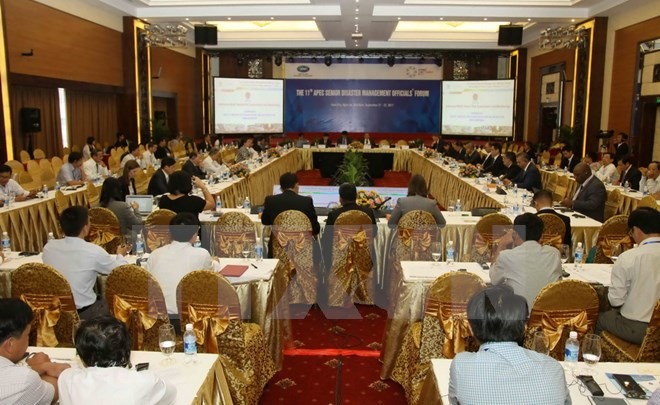 Politics & Law
Politics & Law

APEC disaster officials were working on a recommendation to the leaders of member economies to apply more advanced technology in disaster prevention given the extreme weather the region has been facing.
 |
| Senior officials in disaster management of Pacific Rim economies gathered yesterday morning to begin the 11th Senior Disaster Management Officials’ Forum (SDMOF) of the Asia-Pacific Economic Co-operation (APEC) in Vinh City, Nghệ An Province. — VNA/VNS Photo Thanh Tùng |
NGHỆ AN — APEC disaster officials yesterday worked on a recommendation to leaders of member economies to use more advanced technology in disaster prevention given the "new normal" status of extreme weather in the region has been facing.
Senior officials in disaster management of Pacific Rim economies gathered yesterday morning to begin the 11th Senior Disaster Management Officials’ Forum (SDMOF) of the Asia-Pacific Economic Co-operation (APEC) in Vinh City, Nghệ An Province, an area that was hit by the historically-strong typhoon Doksuri a few days ago.
“The Asia-Pacific region is one of the most dynamic economic regions in the world, but also an area most vulnerable to natural disaster risks,” Việt Nam’s Agricuture and Rural Development Deputy Minister Hoàng Văn Thắng told the 200 delegates at the forum.
In 2017 alone, a series of strong typhoons and storms swept over Asian countries and part of the US.
Việt Nam was no exception. Floods and landslides two months ago wreaked havoc in the country’s northern region, while the centre was battered by typhoon Doksuri last week, killing nine people and causing more than VNĐ11 trillion of losses (US$488.8 million).
The increasingly unpredictable natural disasters in terms of frequency and intensity to have struck around the world have been described by some as the “new normal”.
The United Nations Office for Disaster Risk Reduction as well as countries most vulnerable to natural disasters like the Philippines, Japan and Việt Nam, all agreed on the vital role of developing technology in reducing risks of "new normal" disasters. Using advanced technologies should be a focus in disaster forecast and management work, they said.
“We hope to bring out a joint recommendation to leaders calling for more advanced technology for disaster prevention and post-disaster recovery work,” Thắng said.
Strengthening co-operation
Takeshi Yonezawa, Deputy Director for Disaster Management of Japan’s Cabinet Office said that each APEC member had different geographical locations and thus is vulnerable to different natural disasters.
“Each will have different experiences in fighting natural disasters so the sharing of experience is exceptionally important,” he told Việt Nam News.
Vietnamese deputy minister Thắng believed that regional co-operation was fundamentally key in minimising the impacts of natural disasters.
Many advanced countries, using modern satellite systems, can closely track any storm on Earth and the information can be shared with those due to be affected by the storms to better prepare for the upcoming disasters, Thắng said.
Regional co-operation can also be strengthened in water management between upstream and downstream countries to reduce the risks of landslide in areas near the mouths of rivers.
“Every country has to face natural disasters. Fighting against natural disasters should be a global responsibility to be shared and supported among everyone,” he said.
The 11th SDMOF will last for two days, focusing on measures to strengthen co-operation between APEC member economies in disaster prevention and using technology in the work. - VNS




